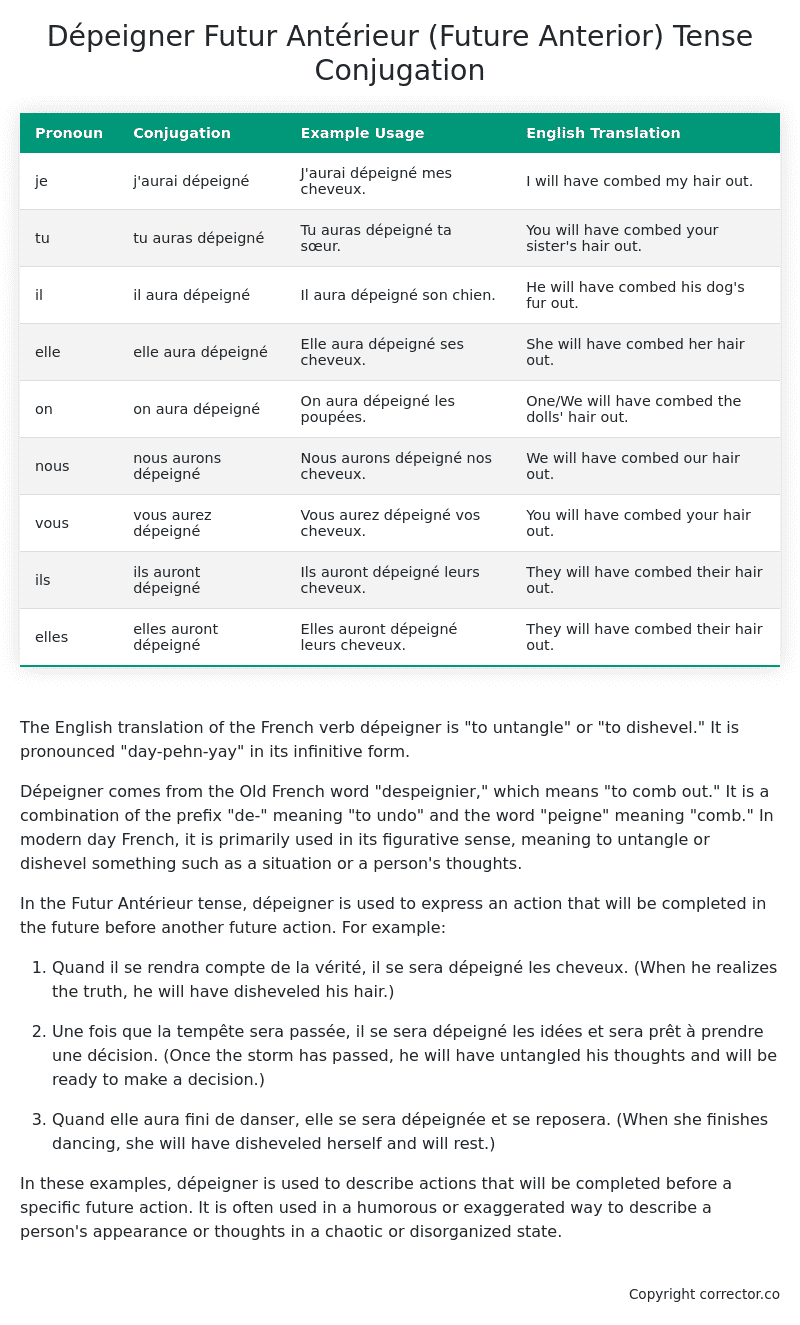Futur Antérieur (Future Anterior) Tense Conjugation of the French Verb dépeigner
Introduction to the verb dépeigner
The English translation of the French verb dépeigner is “to untangle” or “to dishevel.” It is pronounced “day-pehn-yay” in its infinitive form.
Dépeigner comes from the Old French word “despeignier,” which means “to comb out.” It is a combination of the prefix “de-” meaning “to undo” and the word “peigne” meaning “comb.” In modern day French, it is primarily used in its figurative sense, meaning to untangle or dishevel something such as a situation or a person’s thoughts.
In the Futur Antérieur tense, dépeigner is used to express an action that will be completed in the future before another future action. For example:
-
Quand il se rendra compte de la vérité, il se sera dépeigné les cheveux. (When he realizes the truth, he will have disheveled his hair.)
-
Une fois que la tempête sera passée, il se sera dépeigné les idées et sera prêt à prendre une décision. (Once the storm has passed, he will have untangled his thoughts and will be ready to make a decision.)
-
Quand elle aura fini de danser, elle se sera dépeignée et se reposera. (When she finishes dancing, she will have disheveled herself and will rest.)
In these examples, dépeigner is used to describe actions that will be completed before a specific future action. It is often used in a humorous or exaggerated way to describe a person’s appearance or thoughts in a chaotic or disorganized state.
Table of the Futur Antérieur (Future Anterior) Tense Conjugation of dépeigner
| Pronoun | Conjugation | Example Usage | English Translation |
|---|---|---|---|
| je | j’aurai dépeigné | J’aurai dépeigné mes cheveux. | I will have combed my hair out. |
| tu | tu auras dépeigné | Tu auras dépeigné ta sœur. | You will have combed your sister’s hair out. |
| il | il aura dépeigné | Il aura dépeigné son chien. | He will have combed his dog’s fur out. |
| elle | elle aura dépeigné | Elle aura dépeigné ses cheveux. | She will have combed her hair out. |
| on | on aura dépeigné | On aura dépeigné les poupées. | One/We will have combed the dolls’ hair out. |
| nous | nous aurons dépeigné | Nous aurons dépeigné nos cheveux. | We will have combed our hair out. |
| vous | vous aurez dépeigné | Vous aurez dépeigné vos cheveux. | You will have combed your hair out. |
| ils | ils auront dépeigné | Ils auront dépeigné leurs cheveux. | They will have combed their hair out. |
| elles | elles auront dépeigné | Elles auront dépeigné leurs cheveux. | They will have combed their hair out. |
Other Conjugations for Dépeigner.
Le Present (Present Tense) Conjugation of the French Verb dépeigner
Imparfait (Imperfect) Tense Conjugation of the French Verb dépeigner
Passé Simple (Simple Past) Tense Conjugation of the French Verb dépeigner
Passé Composé (Present Perfect) Tense Conjugation of the French Verb dépeigner
Futur Simple (Simple Future) Tense Conjugation of the French Verb dépeigner
Futur Proche (Near Future) Tense Conjugation of the French Verb dépeigner
Plus-que-parfait (Pluperfect) Tense Conjugation of the French Verb dépeigner
Passé Antérieur (Past Anterior) Tense Conjugation of the French Verb dépeigner
Futur Antérieur (Future Anterior) Tense Conjugation of the French Verb dépeigner (this article)
Subjonctif Présent (Subjunctive Present) Tense Conjugation of the French Verb dépeigner
Subjonctif Passé (Subjunctive Past) Tense Conjugation of the French Verb dépeigner
Subjonctif Imparfait (Subjunctive Imperfect) Tense Conjugation of the French Verb dépeigner
Subjonctif Plus-que-parfait (Subjunctive Pluperfect) Tense Conjugation of the French Verb dépeigner
Conditionnel Présent (Conditional Present) Tense Conjugation of the French Verb dépeigner
Conditionnel Passé (Conditional Past) Tense Conjugation of the French Verb dépeigner
L’impératif Présent (Imperative Present) Tense Conjugation of the French Verb dépeigner
L’infinitif Présent (Infinitive Present) Tense Conjugation of the French Verb dépeigner
Struggling with French verbs or the language in general? Why not use our free French Grammar Checker – no registration required!
Get a FREE Download Study Sheet of this Conjugation 🔥
Simply right click the image below, click “save image” and get your free reference for the dépeigner Futur Antérieur tense conjugation!

Dépeigner – About the French Futur Antérieur (Future Anterior) Tense
Construction
Common Everyday Usage Patterns
Interactions with Other Tenses
For example
Summary
I hope you enjoyed this article on the verb dépeigner. Still in a learning mood? Check out another TOTALLY random French verb conjugation!


